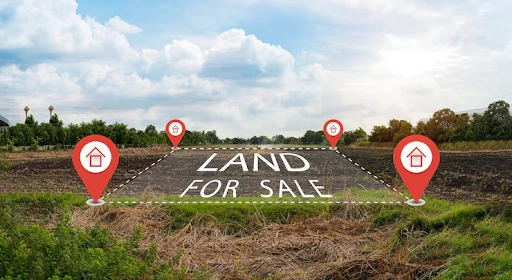Land for Sale in 2025: What Buyers Need to Know Before Investing

Land for Sale in 2025: What Buyers Need to Know Before Investing
The landscape of land ownership is evolving rapidly in 2025, creating both opportunities and challenges for prospective buyers. Whether you’re looking to build a dream home, secure a long-term investment, or simply own a piece of America, understanding the current market dynamics is essential before making your purchase decision.
The Current State of the Land Market
As we navigate through 2025, the land market presents a fascinating contrast to the residential housing sector. While the residential market has experienced a record $700 billion of unsold housing stock throughout the U.S., the raw land market offers unique advantages for savvy investors.
 Land for sale continues to be an attractive option for many buyers, particularly as traditional housing remains challenging to afford. With mortgage rates still hovering near 7% for residential properties, many buyers are exploring alternative paths to property ownership through vacant land purchases.
Land for sale continues to be an attractive option for many buyers, particularly as traditional housing remains challenging to afford. With mortgage rates still hovering near 7% for residential properties, many buyers are exploring alternative paths to property ownership through vacant land purchases.
Why Land Ownership Makes Sense in Today’s Economy
Unlike developed real estate, land ownership often comes with lower barriers to entry. At Discount Lots, for example, buyers can secure land with payments starting as low as $200 per month, making property ownership accessible to a broader range of Americans.
Several factors make land for sale particularly attractive in the current economic climate:
- Lower entry costs: Raw land typically requires less initial investment than developed properties
- Reduced competition: While housing inventory is high, quality land in desirable locations remains limited
- Flexible usage options: From camping to future building sites to investment holdings
- Simplified ownership: Fewer maintenance concerns or ongoing expenses
- Potential appreciation: Strategic land purchases can gain value as development expands
Key Considerations Before Purchasing Land
- Location Analysis: The old real estate adage of “location, location, location” applies doubly to land purchases. Research growth patterns, proximity to infrastructure, and future development plans. States like Arizona, California, Florida, and Texas remain popular due to their climate advantages and growth potential.
- Legal and Zoning Requirements: Understanding what you can legally do with your land is critical. Some parcels come with restrictions that may limit building options, usage types, or development potential. Always verify zoning regulations, building codes, and any deed restrictions before purchasing.
- Access and Utilities: A beautiful piece of land becomes significantly less valuable if it lacks legal access or utility connections. Investigate whether the property has road access, and understand the costs associated with bringing utilities like water, electricity, and internet to the site if they aren’t already present.
- Environmental Considerations: Environmental factors can significantly impact land value and usability. Check for flood zones, protected habitats, soil quality, and other environmental considerations that could affect your plans for the property.
- Payment Options: One advantage of land for sale in today’s market is the availability of flexible payment plans. Many land sellers, including Discount Lots, offer owner financing options that don’t require credit checks or traditional mortgage qualification processes.
Market Trends to Watch in 2025
- Economic Uncertainty: The same economic uncertainty affecting the broader housing market is influencing land transactions. While some buyers are hesitating due to inflation concerns and potential policy shifts, others see land as a hedge against economic volatility.
- Rural Migration Continues: The pandemic-driven exodus to rural areas has slowed but not stopped. Many Americans continue to seek more space and connection to nature, driving demand for land in previously overlooked rural locations.
- Sustainable Land Use: Environmental consciousness is increasingly influencing land purchases, with buyers looking for properties that can support sustainable living, renewable energy installation, or conservation efforts.
- Technology Integration: Advances in technology have made remote land ownership more feasible than ever. From virtual property tours to satellite imaging and remote monitoring systems, technology is changing how people evaluate and manage land investments.
Making Your Land Purchase Decision
As you consider land for sale in 2025, remember that successful land ownership begins with thorough research and realistic expectations. Whether you’re looking to build immediately or hold for the future, understanding the market conditions and property specifics will lead to better outcomes.
FAQ: Land for Sale in 2025
Q. How does buying land differ from buying a house?
When purchasing land for sale, you’re buying an undeveloped property without structures. This typically means lower purchase prices, no mortgage requirement in many cases, different tax considerations, and more flexibility for future use. However, it also means you’ll need to plan separately for any development costs.
Q. Do I need a real estate agent to buy land?
While not always required, working with an agent experienced in land transactions can be valuable. Alternatively, companies specializing in land sales like Discount Lots provide a streamlined buying experience without traditional agent fees.
Q. What financing options are available for land purchases?
Land purchases can be financed through owner financing (like the payment plans offered by Discount Lots), land loans from specialized lenders, home equity loans if you own other property, or cash purchases. Owner financing typically offers the most flexible terms without credit checks.
Q. How long should I plan to hold land as an investment?
Land is generally considered a medium to long-term investment. While exceptional circumstances can create short-term gains, most investors should plan to hold land for at least 5-10 years to realize significant appreciation, particularly for rural or undeveloped parcels.
Q. Can I build immediately after purchasing land?
This depends entirely on local regulations, the specific property, and your preparedness. You’ll need to verify zoning permissions, secure necessary permits, arrange for utilities, and ensure proper access before beginning construction.
Looking for Vacant Land?
Discount Lots has affordable land for sale across the country.
SEARCH FOR LAND
Ready to find a piece of land to call your own? Use our interactive map to search available properties!

